Michael Cole: 1935-2012
Christian explorer who inspired young people to serve the poor
 Michael Cole adopted the words of the Victorian missionary explorer David Livingstone, ‘Sympathy is no substitute for action’, as his own personal motto. In 1974 the direction of the latter part of his life was set when he was challenged to take a water drilling rig to the famine ridden Wollo Province of Ethiopia to provide water for starving people. This showed that the exacting adventure he had always craved could be combined with purposeful, compassionate help to the poorest of the poor. Earlier as a RAF Physical Education Officer, he had climbed the mountain ‘simply because it was there’. Now there was a purpose to it that he could share with others and inculcate in young people.
Michael Cole adopted the words of the Victorian missionary explorer David Livingstone, ‘Sympathy is no substitute for action’, as his own personal motto. In 1974 the direction of the latter part of his life was set when he was challenged to take a water drilling rig to the famine ridden Wollo Province of Ethiopia to provide water for starving people. This showed that the exacting adventure he had always craved could be combined with purposeful, compassionate help to the poorest of the poor. Earlier as a RAF Physical Education Officer, he had climbed the mountain ‘simply because it was there’. Now there was a purpose to it that he could share with others and inculcate in young people.
 For the next four decades, Mike pursued adventure with a purpose to the world’s most remote communities. He led five major expeditions using hovercraft on previously un-navigable rivers to connect isolated people to medical services and community development. He mobilised thousands of others, especially young people from the UK, to stretch themselves in life-changing endeavour in East Asia and Latin America.
For the next four decades, Mike pursued adventure with a purpose to the world’s most remote communities. He led five major expeditions using hovercraft on previously un-navigable rivers to connect isolated people to medical services and community development. He mobilised thousands of others, especially young people from the UK, to stretch themselves in life-changing endeavour in East Asia and Latin America.
Mike was profoundly motivated by his Christian faith. The Christian commitment of many who joined him was deepened not just by his example, but by learning how to depend on God in testing situations and by encountering the vibrant faith of local believers in contexts of poverty. A number of wayward teenagers of UK church leaders re-embraced their Christian heritage after taking part in Mike’s projects.
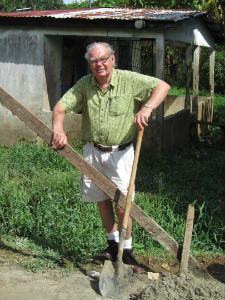 Michael Edwin Cole was born in Enfield, London in 1935. His parents were not church-goers, but he was attracted to join the local Crusaders group, because they had nets on their goal posts. Eric How, a deacon at Winchmore Hill Baptist Church invited Mike and other young local young people to Sunday evening socials in their home. Mike was converted and in time became a youth leader at the church, with Crusaders and on Scripture Union beach missions, where in 1963 he met his future wife, Jacqueline Downing from Manchester.
Michael Edwin Cole was born in Enfield, London in 1935. His parents were not church-goers, but he was attracted to join the local Crusaders group, because they had nets on their goal posts. Eric How, a deacon at Winchmore Hill Baptist Church invited Mike and other young local young people to Sunday evening socials in their home. Mike was converted and in time became a youth leader at the church, with Crusaders and on Scripture Union beach missions, where in 1963 he met his future wife, Jacqueline Downing from Manchester.
 Mike trained as a PE and Geographer teacher and taught briefly in schools in Edmonton, but spurred on by his earlier National Service with the RAF, he was commissioned as a Flying Officer in 1962. As a Physical Education Officer he gained vital experience in running expeditions and leadership training for officer cadets. With several other Christian officers, he initiated the Air Force Christian Link-Up; a network for fellowship including canoeing and skiing holidays for Christian military families.
Mike trained as a PE and Geographer teacher and taught briefly in schools in Edmonton, but spurred on by his earlier National Service with the RAF, he was commissioned as a Flying Officer in 1962. As a Physical Education Officer he gained vital experience in running expeditions and leadership training for officer cadets. With several other Christian officers, he initiated the Air Force Christian Link-Up; a network for fellowship including canoeing and skiing holidays for Christian military families.
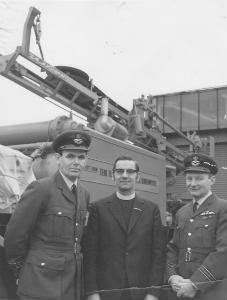 In 1974 Rev. Pat Goodland of Stanmore Baptist, who was the chaplain on the RAF base where Mike was working, challenged him to help deliver a water drilling rig, donated by Tearfund, to the famine area of Ethiopia. Subsequently he met missionary surgeon Dr Bill Gould at a Tearfund Conference, who invited him to visit Nepal and deliver a telephone exchange to the mission hospital in Tansen. Bill shared his vision for using hovercraft to navigate the Himalayan rivers to enable medics and patients to travel rapidly and safely. Mike began planning an expedition to Nepal to test whether the revolutionary design of the highly manoeuvrable six-seater River Rover hovercraft could provide a ‘hover doctor’ service. This was the beginning of his involvement with hovercraft.
In 1974 Rev. Pat Goodland of Stanmore Baptist, who was the chaplain on the RAF base where Mike was working, challenged him to help deliver a water drilling rig, donated by Tearfund, to the famine area of Ethiopia. Subsequently he met missionary surgeon Dr Bill Gould at a Tearfund Conference, who invited him to visit Nepal and deliver a telephone exchange to the mission hospital in Tansen. Bill shared his vision for using hovercraft to navigate the Himalayan rivers to enable medics and patients to travel rapidly and safely. Mike began planning an expedition to Nepal to test whether the revolutionary design of the highly manoeuvrable six-seater River Rover hovercraft could provide a ‘hover doctor’ service. This was the beginning of his involvement with hovercraft.
 In 1979 he led the British Joint Services Hovercraft Expedition to Nepal with 26 team members, many of whom were Christians, and recounted this in his book, Journey to the Fourth World.
In 1979 he led the British Joint Services Hovercraft Expedition to Nepal with 26 team members, many of whom were Christians, and recounted this in his book, Journey to the Fourth World.
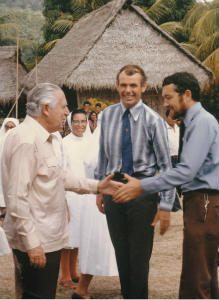 In 1982 he led the Joint Services Hovercraft Expedition to Peru in the aftermath of the Falklands war between Britain and Argentina. Peru sided with Argentina. Exploring the headwaters of the Amazon and demonstrating effective medical services, helped restore goodwill between the UK and Peru. President Belaúnde rode the rapids in the hovercraft and hosted a reception for the team in the
In 1982 he led the Joint Services Hovercraft Expedition to Peru in the aftermath of the Falklands war between Britain and Argentina. Peru sided with Argentina. Exploring the headwaters of the Amazon and demonstrating effective medical services, helped restore goodwill between the UK and Peru. President Belaúnde rode the rapids in the hovercraft and hosted a reception for the team in the
presidential palace in Lima. As a result and for his other services to humanity, Mike was awarded the OBE in 1983.
 In 1985 the RAF assigned him to lead Operation Raleigh, the young peoples’ adventure and community service programme in Peru. At the request of Peruvian church
In 1985 the RAF assigned him to lead Operation Raleigh, the young peoples’ adventure and community service programme in Peru. At the request of Peruvian church
leaders and expatriate missionaries, he also recruited a team of Christian young people who served at the Peace and Hope camp in the northern jungle area for Christian refugees from terrorism.
In response to a challenge from missionary doctor, David Milnes, Mike resigned his RAF commission to become Short Term Experience Projects (STEP) Director of EUSA (now Latin Link). He developed an innovative programme for young people in partnership with churches in Latin America. The first STEP team undertook a construction project in the shanty towns of Arequipa, Peru in 1987.
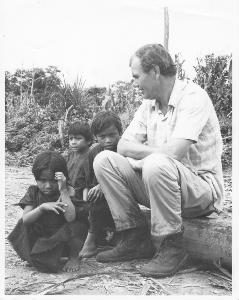 Under Mike’s leadership, the STEP programme rapidly expanded from Peru into Bolivia, Brazil, and Ecuador, and then in 1989 to Argentina into the villas de miseria of Buenos Aires as a project of reconciliation while the UK was still officially at war with Argentina. Over 150 young people from the UK were involved annually.
Under Mike’s leadership, the STEP programme rapidly expanded from Peru into Bolivia, Brazil, and Ecuador, and then in 1989 to Argentina into the villas de miseria of Buenos Aires as a project of reconciliation while the UK was still officially at war with Argentina. Over 150 young people from the UK were involved annually.
Don Ford, General Secretary of EUSA at the time of Mike’s appointment comments, ‘Combined with his leadership skills, God used Mike greatly to motivate scores of young people each year to go to South America and do something to bring about change. The lives of countless needy latinos were transformed by this man of action. Under his enthusiastic leadership STEP took off and spread a network of grace and compassion wherever it went. And STEP remains today as a fruitful project all over Latin America that still bears the marks of eternity for God’s glory.’
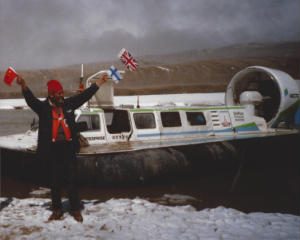 At the same time, Mike planned and led another major hovercraft project, this time to China. In 1990 a child vaccination programme sponsored by UNICEF, and innovative material science research were carried out. The upper reaches of the River Yangtze in the provinces of Sichuan, Qinghai and Tibet were explored by hovercraft, reaching the navigable source of the river. Along the way the team was privileged to meet and encourage isolated Christian believers on the Tibetan plateau. In 1993 he co-led a fourth hovercraft project, developing ‘hover doctor’ services for Australian missionaries on the Fly River Delta of Papua New Guinea.
At the same time, Mike planned and led another major hovercraft project, this time to China. In 1990 a child vaccination programme sponsored by UNICEF, and innovative material science research were carried out. The upper reaches of the River Yangtze in the provinces of Sichuan, Qinghai and Tibet were explored by hovercraft, reaching the navigable source of the river. Along the way the team was privileged to meet and encourage isolated Christian believers on the Tibetan plateau. In 1993 he co-led a fourth hovercraft project, developing ‘hover doctor’ services for Australian missionaries on the Fly River Delta of Papua New Guinea.
 In the same year President Violeta Chamorro of Nicaragua invited Mike to prepare a Hovercraft Communications Project to connect isolated communities of the Caribbean coast and along the Rio San Juan to medical services and community development. A unique hovercraft journey across the Central American isthmus from Bluefields to Managua was completed in May 1995.
In the same year President Violeta Chamorro of Nicaragua invited Mike to prepare a Hovercraft Communications Project to connect isolated communities of the Caribbean coast and along the Rio San Juan to medical services and community development. A unique hovercraft journey across the Central American isthmus from Bluefields to Managua was completed in May 1995.
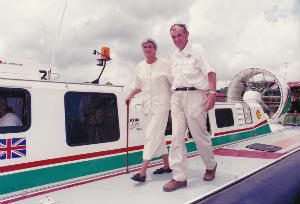 In 1996 Mike decided to focus on Nicaragua with the first volunteer projects on the Caribbean coast organised by the newly established Peace and Hope Trust, named after the first young people’s project in Peru back in 1985.
In 1996 Mike decided to focus on Nicaragua with the first volunteer projects on the Caribbean coast organised by the newly established Peace and Hope Trust, named after the first young people’s project in Peru back in 1985.
Since then teams of volunteers have travelled to Nicaragua several times a year to undertake worthwhile tasks of practical and spiritual encouragement, including medical work, educational projects, vocational training, farming and numerous enterprises from bakeries to barbers. For this service Mike was awarded the Medal of Honour, the highest award for expatriates by the Nicaraguan Government in 2000.
 Through out this remarkable ministry, Mike was undergirded by unwavering support, patience and accountability from his wife Jackie. In a God-centred partnership of 48 years they spurred one another to fulfil God’s gifting in and through them as individuals and a couple.
Through out this remarkable ministry, Mike was undergirded by unwavering support, patience and accountability from his wife Jackie. In a God-centred partnership of 48 years they spurred one another to fulfil God’s gifting in and through them as individuals and a couple.
In recent years, brushing aside his own deteriorating health, Mike continued to visit Nicaragua several times a year with characteristic resilience to initiate new areas of service, including experimental farming, most notably the ‘moringa’ miracle plant.
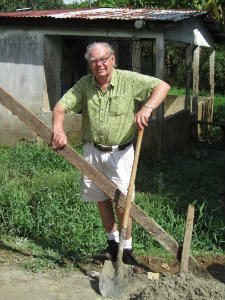 The Michael Cole eco-lodge training facility was opened by his son Nick in Matagalpa, central Nicaragua on 31 July 2012 as he watched on from the UK via a web cam. However his real legacy is not so much in projects finished, extraordinary hovercraft journeys completed or handshakes from Latin American presidents, but in the lives of thousands of young people in the UK and Latin America whom he inspired and guided into Christian commitment and service, resourceful leadership and to realise their God-given potential.
The Michael Cole eco-lodge training facility was opened by his son Nick in Matagalpa, central Nicaragua on 31 July 2012 as he watched on from the UK via a web cam. However his real legacy is not so much in projects finished, extraordinary hovercraft journeys completed or handshakes from Latin American presidents, but in the lives of thousands of young people in the UK and Latin America whom he inspired and guided into Christian commitment and service, resourceful leadership and to realise their God-given potential.